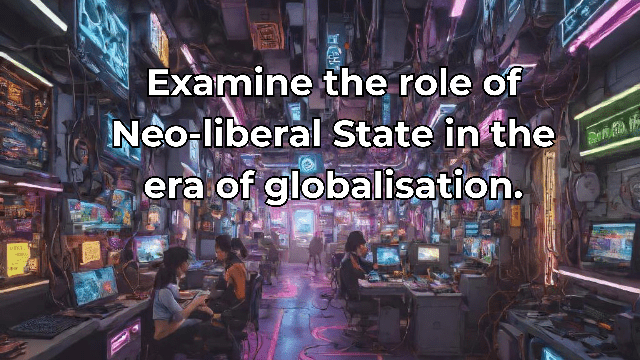Role of Neo-liberal State in the era of globalisation.
The Role of the Neo-liberal State in the Era of Globalisation
The neo-liberal state, characterized by policies that emphasize free markets, deregulation, privatization, and reduced government intervention in the economy, has played a significant role in shaping the dynamics of globalization. This essay examines the role of the neo-liberal state in the context of globalization, exploring its impact on economic policies, social structures, and the global economy.
1. Economic Policies and Market Dynamics
Neo-liberalism advocates for minimal state intervention in economic activities, promoting the idea that free markets are the most efficient allocators of resources. In the era of globalization, this has led to widespread deregulation, where governments reduce restrictions on business operations, trade, and capital flows. The belief is that removing barriers will stimulate economic growth, increase competition, and improve efficiency. This approach has facilitated the integration of national economies into the global market, promoting cross-border trade and investment.
Privatization, another cornerstone of neo-liberal policies, involves transferring public sector enterprises and services to private ownership. This shift is driven by the belief that the private sector, motivated by profit, is more efficient than the public sector. In the global context, privatization has attracted foreign investment, leading to increased capital inflows and the modernization of industries in many developing countries. However, critics argue that privatization can lead to the concentration of wealth and power, exacerbating inequalities.
2. Global Trade and Investment
The neo-liberal state has played a pivotal role in promoting free trade agreements and reducing tariffs and trade barriers. Institutions like the World Trade Organization (WTO) and regional trade agreements such as NAFTA and the EU have been instrumental in creating a global trading system based on neo-liberal principles. These agreements have facilitated the movement of goods, services, and capital across borders, contributing to the growth of multinational corporations and global supply chains.
Foreign direct investment (FDI) is another significant aspect of globalization influenced by neo-liberal policies. The reduction of barriers to FDI has enabled multinational corporations to invest in various countries, leading to the transfer of technology, skills, and capital. This has spurred economic development in many parts of the world, creating jobs and boosting incomes. However, the benefits of FDI are often unevenly distributed, with concerns about labor exploitation, environmental degradation, and the erosion of local cultures and industries.
3. Social Structures and Inequality
While neo-liberal policies have driven economic growth and globalization, they have also been associated with rising inequality. The focus on market efficiency and profit maximization often leads to social costs, such as job insecurity, wage stagnation, and reduced social safety nets. In many countries, the weakening of labor unions and the decline of collective bargaining power have contributed to growing income disparities.
Globalization under neo-liberalism has also impacted social structures by promoting consumerism and individualism. The spread of global brands and media has influenced lifestyles and consumption patterns worldwide. While this has led to greater cultural exchange and the diffusion of ideas, it has also raised concerns about cultural homogenization and the loss of local identities.

4. The Role of International Institutions
International financial institutions such as the International Monetary Fund (IMF) and the World Bank have been key proponents of neo-liberal policies. They often condition financial assistance to developing countries on the implementation of structural adjustment programs (SAPs) that emphasize fiscal austerity, deregulation, and privatization. While these programs aim to stabilize economies and promote growth, they have been criticized for causing social hardship and undermining public services.
5. Challenges and Criticisms
The neo-liberal state and its role in globalization face several challenges and criticisms. One major criticism is that neo-liberal policies prioritize economic growth over social equity and environmental sustainability. The focus on deregulation and profit maximization can lead to negative externalities, such as environmental degradation and social unrest.
Moreover, the 2008 global financial crisis exposed the vulnerabilities of the neo-liberal economic model. The crisis highlighted the risks associated with financial deregulation and the unchecked growth of the financial sector. In response, there have been calls for rethinking the role of the state in regulating markets and ensuring economic stability.
Conclusion
The neo-liberal state has played a crucial role in shaping the era of globalization, promoting free markets, deregulation, and privatization. While these policies have driven economic growth and facilitated global integration, they have also contributed to rising inequality and social challenges. As the world continues to grapple with the complexities of globalization, there is a growing recognition of the need to balance market efficiency with social equity and environmental sustainability. This calls for a re-evaluation of neo-liberal policies and the exploration of alternative models that promote inclusive and sustainable development.
Click Here for More Related Question & Answers
Click Here for IGNOU Assignment Questions
